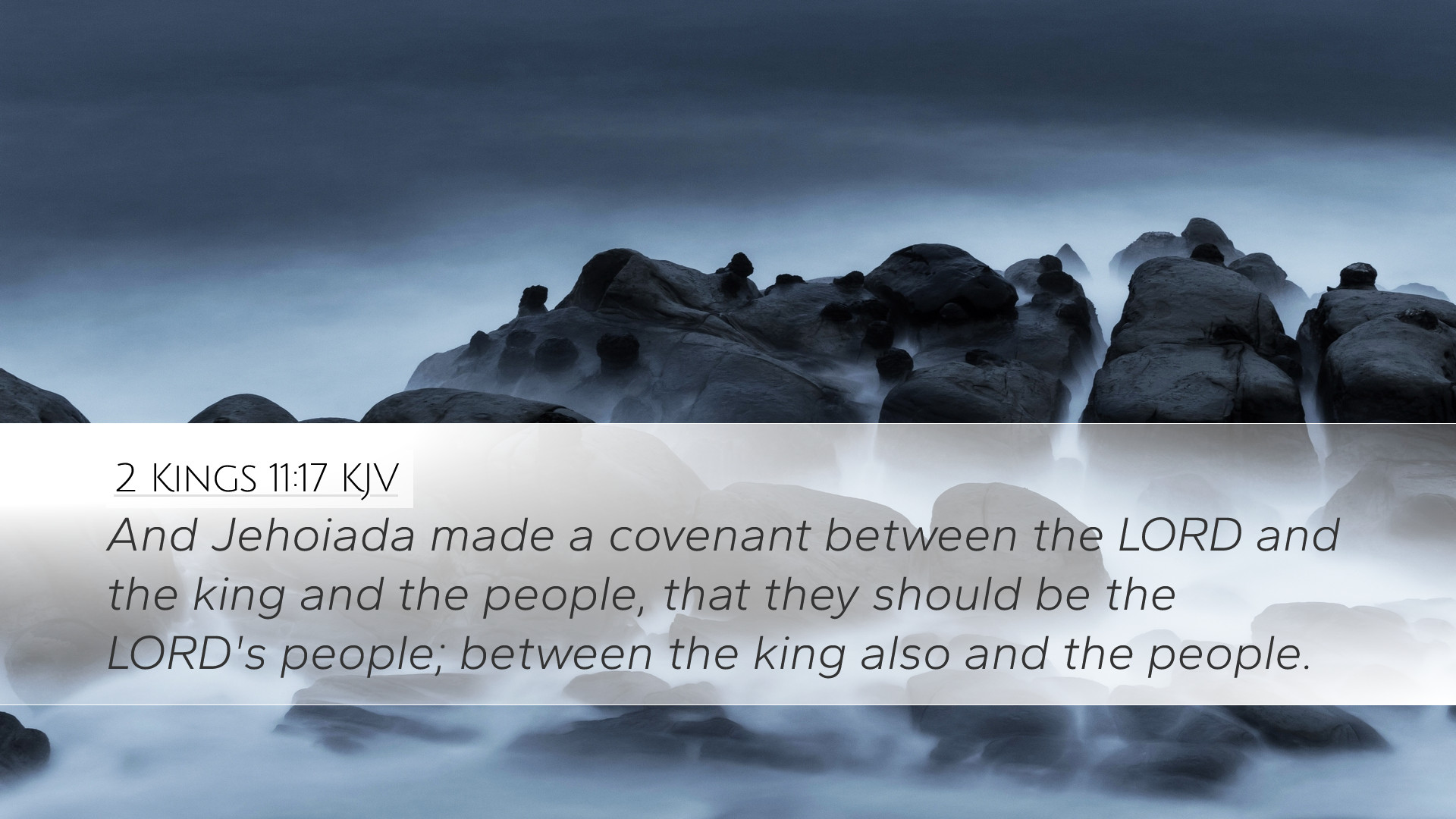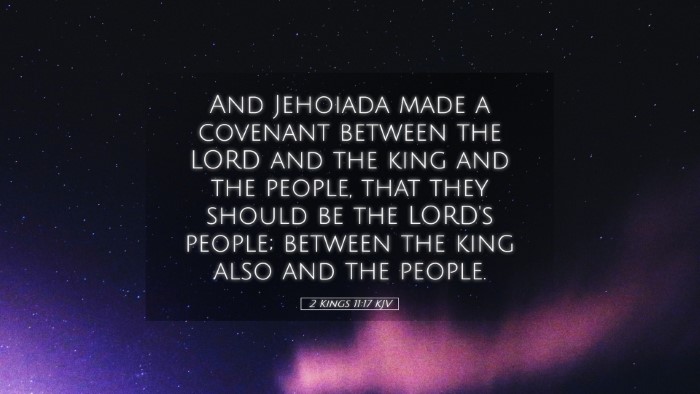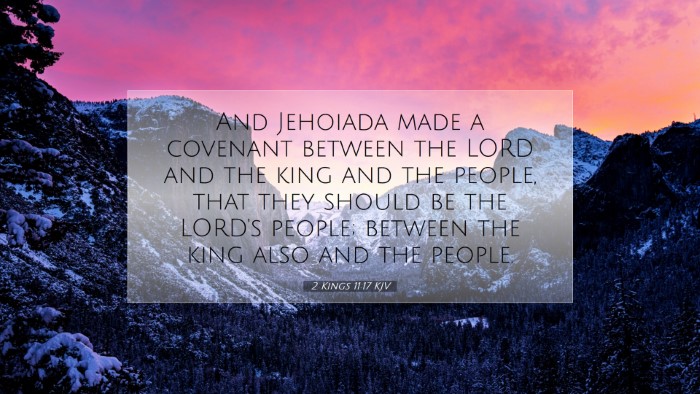Old Testament
Genesis Exodus Leviticus Numbers Deuteronomy Joshua Judges Ruth 1 Samuel 2 Samuel 1 Kings 2 Kings 1 Chronicles 2 Chronicles Ezra Nehemiah Esther Job Psalms Proverbs Ecclesiastes Song of Solomon Isaiah Jeremiah Lamentations Ezekiel Daniel Hosea Joel Amos Obadiah Jonah Micah Nahum Habakkuk Zephaniah Haggai Zechariah Malachi2 Kings 11:17
2 Kings 11:17 KJV
And Jehoiada made a covenant between the LORD and the king and the people, that they should be the LORD's people; between the king also and the people.
2 Kings 11:17 Bible Commentary
Commentary on 2 Kings 11:17
Bible Verse: "And Jehoiada made a covenant between the LORD and the king and the people, that they should be the LORD's people; between the king also and the people."
Introduction
This verse highlights the pivotal moment in Israel's history when a covenant was established between God, King Joash, and the people of Judah. The context of this event reveals significant themes of loyalty, leadership, and spiritual renewal, which are essential for understanding the dynamics of biblical leadership and covenant theology.
Historical Context
The events surrounding this verse take place during a turbulent time in Judah's history. The usurpation of Athaliah, following the death of her son Ahaziah, led to a period of chaos and idolatry. Jehoiada the priest emerged as a key figure in restoring rightful worship and governance. This restoration involves not merely a political change but a spiritual revival as well.
The Covenant
The act of making a covenant is significant in the Old Testament. Covenants often signify serious commitments, establishing the terms of relationship between God and His people. As Albert Barnes notes, this covenant emphasized the rightful authority of God in the lives of the people and their king. It was an acknowledgment of God's sovereignty and a commitment by the people to serve Him faithfully.
- Divine Sovereignty: The covenant underscores the essential belief in God's governance over Israel. Jehoiada's action denotes a return to a theocratic monarchy where God reigns through an appointed king.
- Relational Commitment: The covenant not only binds the king to God but also the people, affirming that their identity as a nation is rooted in their allegiance to the Lord.
- Restoration and Consecration: Both the king and the people agree to fidelity to the Lord, representing restoration from the idolatrous practices that had prevailed under Athaliah's reign.
Insights from Commentaries
Matthew Henry
Matthew Henry emphasizes the importance of public and private covenants. He elaborates on how such an agreement must reflect a genuine commitment from all parties involved. In his view, Jehoiada's leadership exemplifies the qualities of true religious reformers who envision a society aligned with divine principles.
Albert Barnes
Barnes highlights the dual nature of the covenant: it’s not only a commitment from the king but also involves the people’s active role in reaffirming their relationship with God. He suggests that this moment was critical in ensuring the stability of the kingdom and returning the people to a path of righteousness.
Adam Clarke
Adam Clarke notes the covenant’s implications for future kings and the nation. He articulates that this covenant represents a significant shift away from tyranny toward a governance that incorporates divine guidance and community approval. Clarke maintains that this verse is not just historical but serves as an instructive lesson on the nature of leadership and communal responsibility in faith.
Theological Implications
This event offers profound theological insights relevant to contemporary faith communities.
- Covenant Theology: This verse stresses the ongoing nature of covenant relationships as foundational to God’s interaction with humanity. It invites reflection on how modern believers perceive their commitment to God and one another.
- Leadership and Accountability: The character of Jehoiada presents a model for leadership that intertwines civic duty with spiritual integrity. It challenges current leaders to consider how their actions align with God’s expectations and the community's well-being.
- Renewal Movements: The restoration achieved in this covenant can inspire current movements of revival within the church. It serves as a reminder that return to faith can lead to significant transformation in both individual lives and communal identity.
Practical Applications
For pastors, students, theologians, and scholars, there are numerous applications arising from this verse:
- Teaching on Covenantal Relationships: Encourage congregations to explore the essence of being in covenant with God. How does this shape their identity and mission?
- Encouraging Spiritual Revival: Reflect on the catalysts that lead to spiritual renewal. How can leaders inspire a commitment to God that involves both heart and action?
- Community Involvement: Encourage discussions about the role of community in holding leaders accountable. What practices can be instituted to ensure mutual respect and commitment to God’s principles?
Conclusion
2 Kings 11:17 encapsulates a transformative moment in Israel's history marked by a divine covenant. The insights from various public domain commentaries enhance our understanding of the text's depth and relevance. It reminds us of the importance of returning to God’s covenantal embrace and the collective responsibility of leaders and their communities to uphold righteousness.


